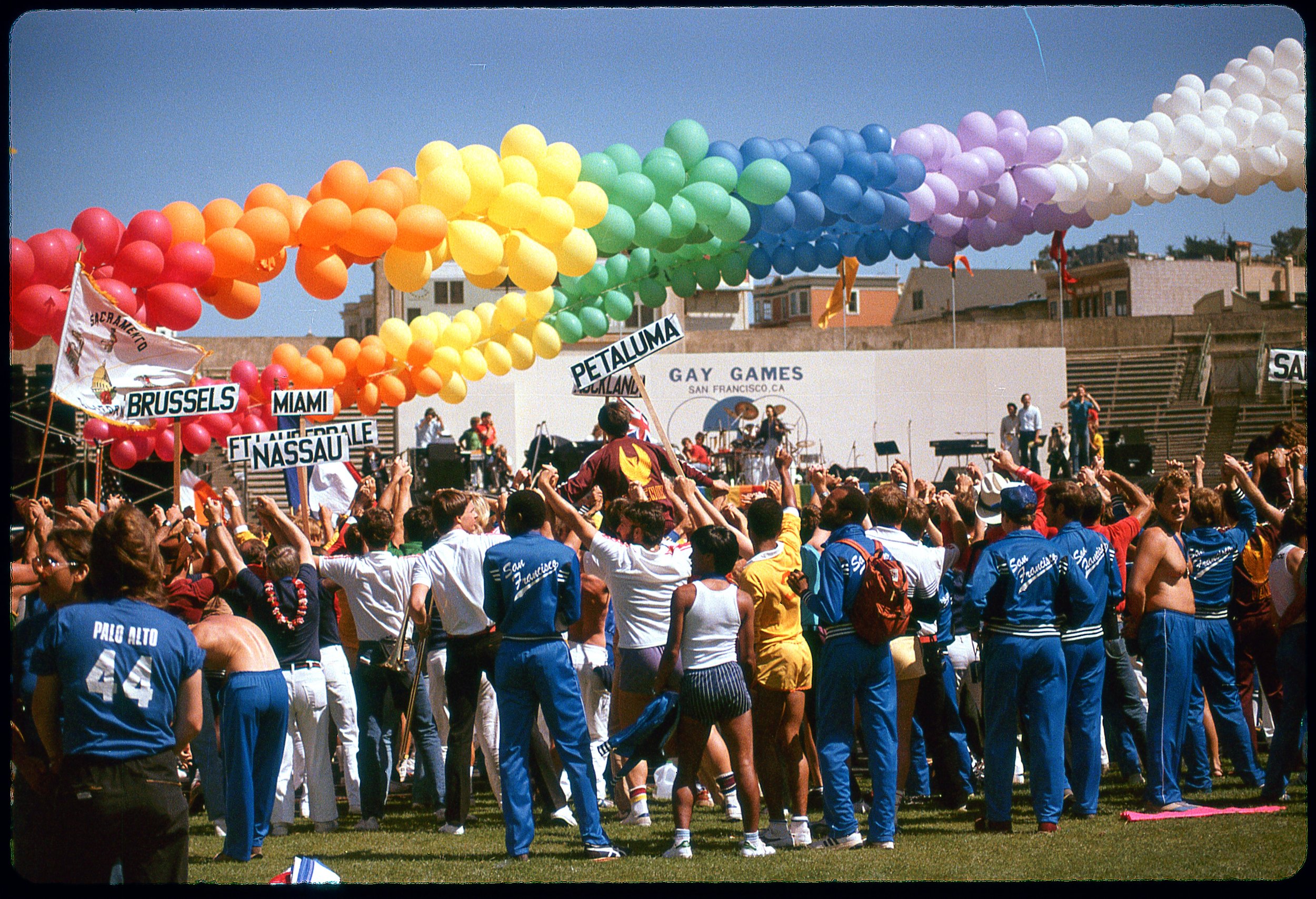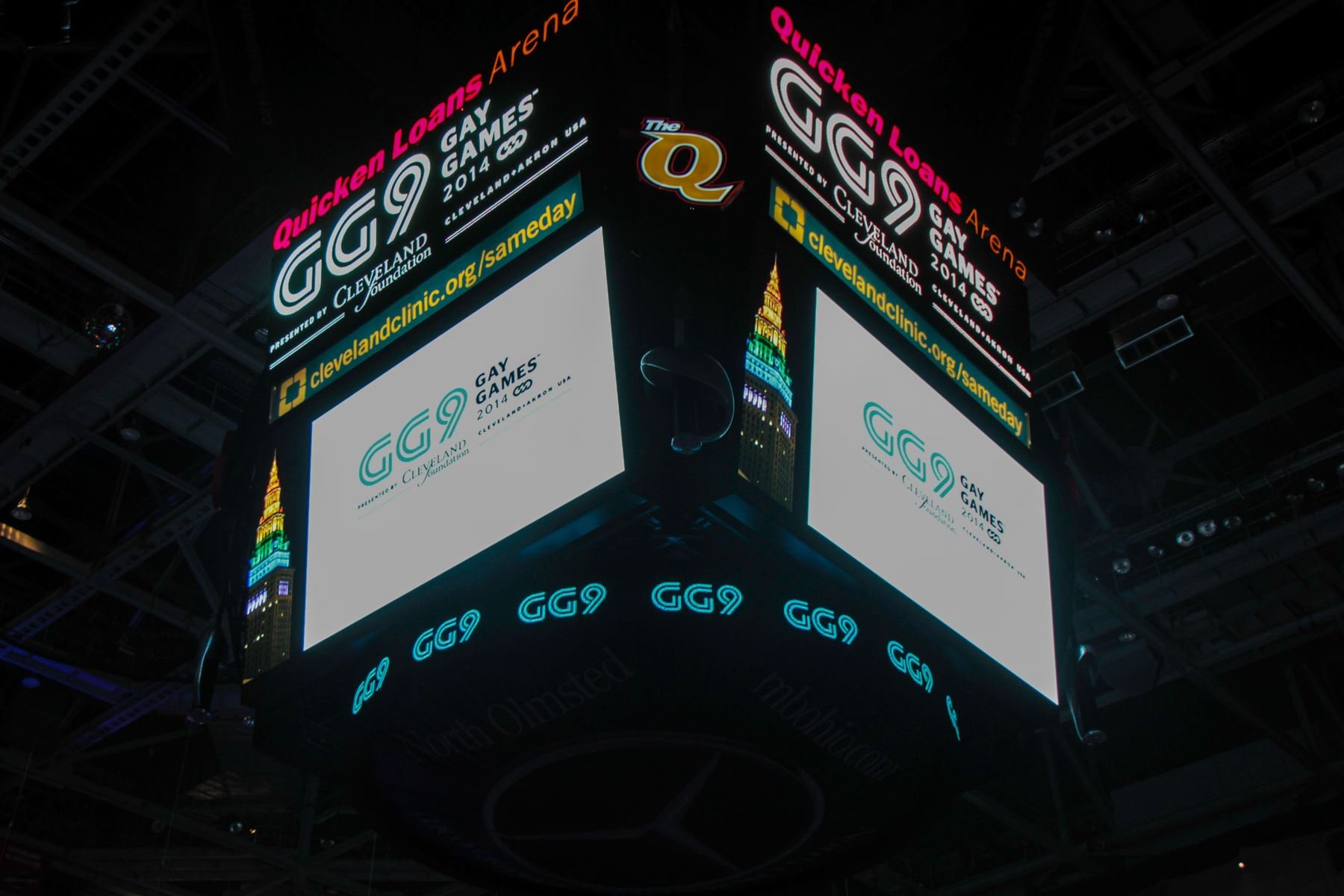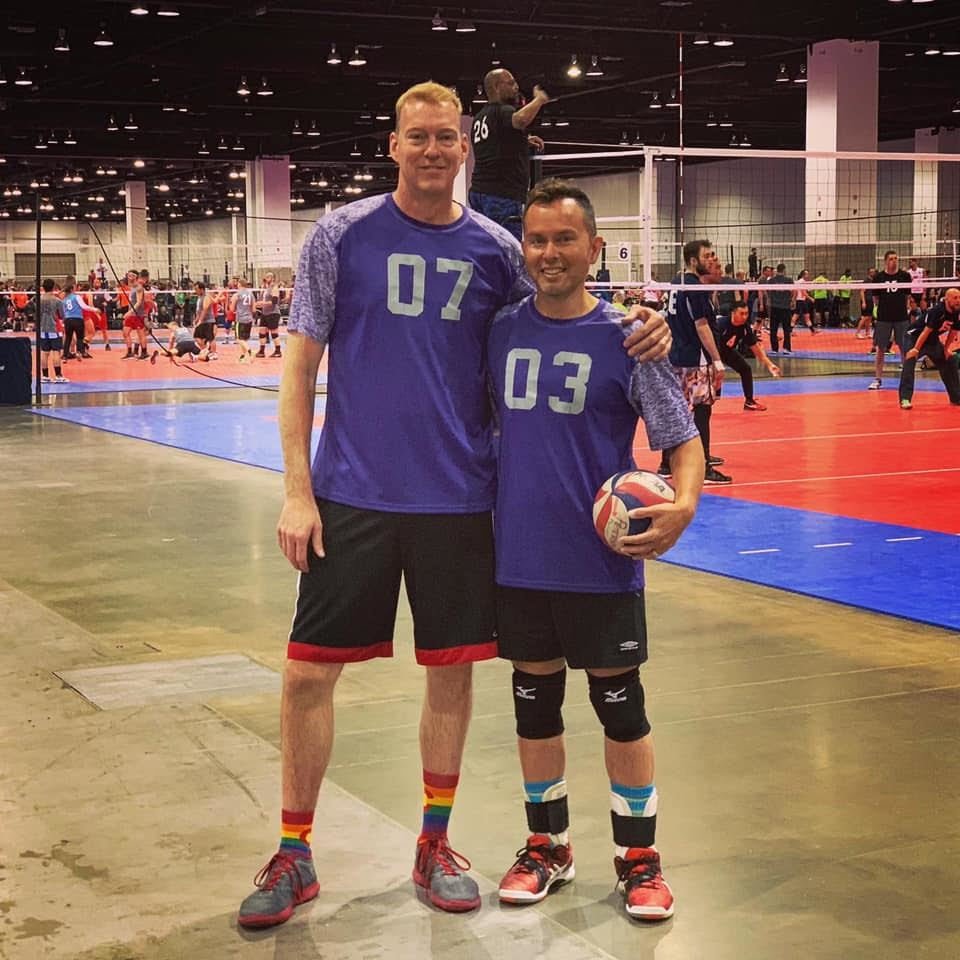
Passing the Torch
19.
CLE Reorganization, 1QE / 1WE
Gay Games IX Opening Ceremony. Quicken Loans Arena, Cleveland, Ohio 2014. Photo: Tricia Uveges
Tony Smith (R) and his husband at Gay Games IX Volleyball in Cleveland, 2014
TONY SMITH: Gay sports began playing a part in my life when I moved to Denver in late 2000. During my very first weekend in my new city, I was invited to play flag football by a friend with people that continue to be friends to this day. By participating, I immediately felt included and did my personal best to fit it with a sport I’d never played before. This participation, inclusion, and personal best set the tone for the next 20+ years.
I met my husband of 20 years playing volleyball in 2002. I’m a 5’6” setter and he’s a 6’6” middle blocker – a match made in heaven! This led to playing league year-round with the Colorado Gay Volleyball Association (CGVA), and I was quickly asked to join the board of directors due to my then-profession of being an event producer – very needed skills to help manage league logistics, marketing and more. Events and sports bring people together for greater purposes, and I grew up loving events because of all my Mother’s awesome Filipino Disco Parties for family and friends.
While serving CGVA, I learned of the Federation of Gay Games (FGG) and immediately knew that it’d be a logical progression in my spirit of giving back to our community. My goal of serving the FGG was inspired by my family’s long history giving back through military service, not to mention one of my Gay Uncle’s participation in the early fights for Gay equality in the 1960s.
EMY RITT: Soon after being named as the Host of the 2014 Gay Games, the Cleveland Organizing Team started showing signs of improper behavior, questionable financial dealings, and poor leadership. The many hours, days, and months of ensuing discussions accompanied by the wringing of hands, the gnashing of teeth, etc. resulted in FGG transferring the Host responsibilities to a new Cleveland-based team, which consisted of most of the original team, minus the ill-equipped leadership. This action then led, sadly, to several lawsuits being filed by the displaced parties.
Thankfully, by the end of 2012, the situation had been settled, even if at great expense, and the Cleveland team resumed their work with new leadership in place: Tom Nobbe as Executive Director and Rob Smitherman as VP of Operations. Rob had already worked for both Chicago GGVII and Cologne GGVIII, so his excellent experience was invaluable to GG9.
To address the elephant in the room, could these issues have been avoided? As FGG Co-President at the time, I have asked myself that question so many times. The short answer is “yes.” Since the first Gay Games in 1982, the FGG had been handling important Site Selection decisions in a rather informal way, based mostly on trust. Legend has it that Gay Games Founder, Dr. Tom Waddell, awarded the third Gay Games to Vancouver’s Richard Dopson with a simple handshake.
Although FGG had been gradually formalizing the Site Selection process and its related documents since even before the Montreal schism, there were still gaps in the process concerning due diligence. There was still a need to formally and adequately verify the bona fides of the people involved, perform background checks, and confirm that there was no previous history of illegal or dubious activities, business or otherwise, before signing any contracts.
versus
SHAMEY CRAMER: Not long after I was elected to the FGG Board as Officer of Ceremonies late in 2011, Co-President Kurt Dahl contacted me, asking if I would be interested in being part of a revitalized 1QE negotiation team. I immediately said yes.
One of the first things I made clear was that if there was going to be any serious discussion of our two organizations coming together, an outside audit of both organizations would be necessary. I reached out to an organization based in Chicago that provided valuations for sports events for the sake of corporate sponsors. It was going to cost, but if both organizations agreed to split the fee, it wouldn't be so bad, and would prove to be a wise investment in the long run. Given that both organizations had struggled to attract major corporate sponsorship, having a report such as this would alleviate many concerns a company might have in tying its brand to a global sports event promoting inclusion and diversity.
Kurt, Emy, and the FGG Negotiating Team (Dennis Sneyers, Klaus Heusslein, and myself) were all in favor of the idea. GLISA Co-President Wessel Van Kampen, head of their negotiating team, immediately rejected this suggestion when we proposed it in the email discussion prior to meeting in Montreal in May 2012. GLISA continued to refuse to have an independent third-party financial audit throughout the entire time I was a member of the 1QE and 1WE negotiating team (2012-2016).
They would also only agree to a deal where both the FGG and GLISA would receive a license fee of US$225,000 - basically double the license fee a host organization paid to the FGG at that time. Given that no previous host had fulfilled that obligation, it was ludicrous to think it would be a sensible move to have a host city pay double that amount in order to have two governing bodies tell them what to do.
When we informed our GLISA counterparts in Montreal that the FGG had rejected their offer, I distinctly recall one of the GLISA representatives first comments being: “But you have all the money.” I thought the comment so unusual - and in hindsight, quite telling - that I wrote it down in my notes.
They could plan and dictate terms all they wanted in our meetings, but I was never going to allow a deal to be signed without an independent financial review, or doubling the burden to a host organization. To do so would be a grave dereliction of duty by an officer of any Board of Directors, non-profit or not.





